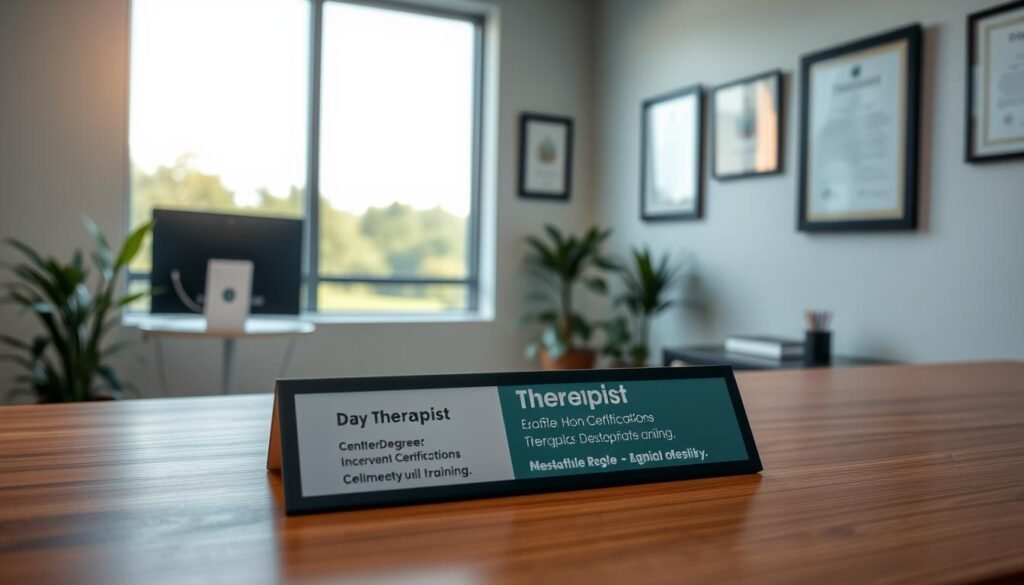Did you know that 1 in 5 U.S. adults experiences mental health challenges each year? Yet, only half seek help due to cost, stigma, or lack of access. Modern solutions like digital platforms bridge this gap, offering professional support from home.
A leading CBT-based platform provides 24/7 access to licensed therapists. Users gain tools like worksheets and journals, making progress between sessions easier. With a 4.8/5 average rating, it’s a trusted choice for many.
Affordability matters too. A 20% first-month discount makes starting simpler. Services are HIPAA-compliant and available globally, ensuring privacy and accessibility.
Key Takeaways
- 1 in 5 adults faces mental health challenges yearly.
- CBT-based digital platforms offer flexible support.
- Licensed therapists are available around the clock.
- Self-help resources enhance therapy effectiveness.
- Discounts make professional care more affordable.
What Is Online-Therapy.com?
Online-Therapy.com transforms mental health support through technology. This digital platform specializes in cognitive behavioral therapy (CBT), blending live sessions with interactive tools like worksheets and meditation guides. Designed for flexibility, it removes barriers to professional care.
A Brief Overview of the Platform
Since 2009, the service has helped thousands manage over 50 mental health conditions. Users access licensed therapists and self-paced resources, creating a holistic therapy program. Real-time progress tracking and HIPAA-compliant communication ensure both effectiveness and privacy.
Founding and Mission
Founder Carl Nordstrom launched the platform after researching CBT’s online efficacy. Partnering with Harvard Medical School experts like Dr. Elizabeth Lombardo, the team refined evidence-based methods. Their goal? To make expert therapy affordable and accessible worldwide—no matter your location or schedule.
How Does Online-Therapy.com Work?
Getting started with professional mental health support is easier than you think. The platform’s 10-minute sign-up process removes barriers, letting you connect with a licensed therapist quickly. Before beginning, crisis resources are clearly highlighted for immediate help if needed.
Sign-Up Process and Initial Matching
Answer a brief questionnaire about your needs and preferences. While gender options are limited, the algorithm prioritizes your stated goals for therapist matching. Matches happen instantly, though you can request a change if needed.
The live chat feature lets you message your therapist anytime. This flexibility ensures support aligns with your schedule, not office hours.
Dashboard and Therapy Toolbox
Your personalized dashboard organizes everything in one place. Schedule therapy sessions, track progress, or access CBT worksheets between appointments. The toolbox includes a journal, activity planner, and meditation videos to reinforce learning.
Everything is designed for consistency. Whether you prefer live chat or structured sessions, tools adapt to your pace.
Subscription Plans and Pricing
Finding the right mental health support shouldn’t break the bank. The platform offers tiered plans, ranging from $60 to $120 per week, designed to fit diverse needs and budgets. Each includes a 20% first-month discount, making it easier to start.
Basic Plan: Messaging and Worksheets
At $60 per week, the Basic Plan focuses on self-paced tools. Unlimited messaging with your therapist and access to CBT worksheets help you make progress between sessions.
Standard Plan: Live Sessions Included
For $80 per week, the standard plan adds one live video or audio session. Ideal for those who prefer real-time interaction alongside digital resources.
Premium Plan: Enhanced Support
The premium plan ($120 per week) includes two live sessions. This tier suits users wanting deeper engagement and more frequent check-ins.
Couples Therapy Plan
Priced at $100 per week, couples therapy includes joint messaging and a shared live session. Note: Partners must create separate accounts.
All plans require a 30-day minimum commitment. While insurance isn’t accepted, the platform provides documentation for reimbursement claims.
Therapist Matching and Qualifications
Quality therapy starts with a well-matched professional. The platform ensures every provider meets strict criteria, including 2,000 clinical hours and specialized CBT therapy certification. This guarantees expertise tailored to your needs.

Licensing and Specializations
Therapists like Bernadette Eze, who helped clients overcome severe depression, undergo rigorous vetting. Each holds state licenses and completes ongoing CBT training. Profiles display credentials, therapeutic approaches, and client reviews for transparency.
The global network includes specialists for anxiety, trauma, and more. While some demographics face limited availability, the platform prioritizes diverse expertise to match unique needs.
Switching Therapists
Not every matched therapist clicks. Users can switch instantly via a provider list—no awkward conversations required. This flexibility ensures you find the right fit without delays.
Changes are common and encouraged. The goal is your comfort, so the process is designed to be hassle-free.
User Experience: Pros and Cons
Balancing convenience with effectiveness is key in digital mental health services. This platform combines structured tools with flexible access, though some limitations affect certain users.
Ease of Use and Accessibility
The mobile-friendly design lets users manage therapy on the go. Daily worksheet feedback (weekdays only) keeps progress consistent. Multiple communication channels—live chat, video, and audio—cater to different preferences.
Users praise the 24/7 resource library and CBT worksheets. These tools help reinforce skills between sessions, making every week more productive.
Limitations and Drawbacks
No crisis support or medication management is available. Geographic licensing restricts access in some regions. While most find the interface intuitive, others note a learning curve.
Therapist responsiveness varies—some reply within hours, others take days. Weekend support is limited, which may frustrate users needing immediate help.
Key Takeaways:
- 24/7 resources and structured CBT boost engagement.
- Mobile access works well, but no app exists.
- Licensing limits and no crisis support are notable gaps.
Live Sessions and Communication
Flexible communication options make therapy more accessible than ever. The platform offers multiple ways to connect with your therapist, ensuring support fits your schedule and comfort level.
Video, Audio, and Text Options
Live sessions run for 45 minutes via your preferred medium. Choose video for face-to-face interaction or audio if you prefer privacy. Therapist Marie Chisholm successfully helped a truck driver client using audio-only sessions during long hauls.
Calendar integration sends reminders before appointments. The system works across devices, letting you join from phones, tablets, or computers. This flexibility helps maintain consistency in your therapy routine.
Therapist Responsiveness
Between live sessions, messaging keeps the conversation going. Most therapists respond within hours on weekdays. However, replies may take longer on weekends when many providers are unavailable.
Email notifications about new messages sometimes raise privacy concerns. The platform uses secure channels, but users should check their notification settings. Weekday-only responses remain a limitation for those needing immediate weekend support.
Key features:
- Multiple session formats (video/audio/text)
- 45-minute live sessions with licensed professionals
- Weekday messaging with typically fast responses
- Calendar sync helps track appointments
CBT Worksheets and Additional Tools
Structured tools can boost your therapy progress between sessions. The platform offers 25+ interactive worksheets covering anxiety, relationships, and self-esteem. These turn CBT principles into daily actions.
Self-Paced Learning
Therapist-reviewed modules provide immediate feedback on completed assignments. A “Ta-da” list visually tracks weekly achievements, reinforcing positive habits.
Progress tests every two weeks measure improvement. Your private journal stays confidential—therapists only see shared entries.
Yoga and Meditation Resources
Short yoga videos reduce stress through guided movement. Meditation content specifically supports mental health goals like focus or sleep.
These tools integrate with your therapy program, creating a holistic approach. Users report better session outcomes when combining live guidance with self-paced work.
Privacy and Security Measures
Your privacy matters as much as your mental well-being. The platform uses HIPAA-compliant protocols and military-grade encryption to protect your sessions and personal data. Every feature is designed to keep your information confidential.
How Your Data Is Protected
256-bit encryption safeguards all messages, video calls, and documents. Automatic data deletion after two years reduces long-term risks. For extra privacy, use a nickname instead of your real name.
Third-party audits verify HIPAA compliance annually. The three-tiered security system includes firewalls, intrusion detection, and strict access controls. Research data is anonymized to protect participant identities.
Global Standards and Transparency
The platform adheres to international data protection laws. Emergency contacts are required but stored separately for crises only. Users receive clear explanations about how their insurance documentation is handled.
Key features:
- HIPAA-compliant infrastructure with regular audits
- End-to-end encryption for all communications
- Optional anonymity with nickname support
- Automatic data purging after 24 months
Who Is Online-Therapy.com Best For?
Mental health support should fit your lifestyle, not the other way around. This platform excels for those seeking structured, flexible care without office visits. It’s a great option for specific needs but isn’t suited for emergencies.
Ideal Candidates
Busy professionals benefit from 24/7 messaging and weekend sessions. Those comfortable with digital tools thrive using worksheets and live chats.
Couples improve communication through shared sessions. Clients preferring therapy with measurable progress love the CBT focus.
Conditions Treated
The platform tackles anxiety, PTSD, and mild-to-moderate depression effectively. Relationship issues and stress management are also common focuses.
It’s not for crisis care or severe conditions needing in-person intervention. For everyday mental health challenges, though, it delivers consistent results.
Comparing Online-Therapy.com to Traditional Therapy
Mental health care has evolved significantly with digital options now rivaling traditional methods. Both deliver professional support but differ in cost, convenience, and delivery format. Understanding these differences helps choose the right services for your needs.
Cost and Convenience Advantages
Digital platforms save users an average of 80% versus in-person visits. No commuting means reclaiming hours weekly—especially valuable for rural residents or busy parents. Insurance often covers less for virtual therapy, but the lower base cost frequently balances this.
Stigma-sensitive users appreciate the anonymity. Scheduling happens without clinic waitlists, often with same-week availability. Blended approaches are possible too—some start digitally before transitioning to occasional office visits.
Effectiveness of Online CBT
Studies show behavioral therapy works equally well digitally for anxiety, depression, and PTSD when cases aren’t acute. The structured CBT format translates well to worksheets and video sessions. Progress tracking tools sometimes outperform traditional paper diaries.
Key differences emerge in crisis support and medication management—areas still needing in-person care. For ongoing mental wellness though, digital platforms provide consistent, measurable results with greater flexibility.
Customer Reviews and Testimonials
Real user experiences reveal what truly works in digital mental health care. With a 4.8/5 average rating, most clients report meaningful progress through structured CBT tools and consistent support.
Transformative Success Stories
User “Lostandfound” credits therapist Bernadette Eze for overcoming severe depression. Weekly sessions and thought records helped rebuild daily functioning.
Joe Wegner’s case study shows measurable thought pattern improvement in eight weeks. Chelsea Schuringa’s clients praise her skill at breaking negative loops through targeted worksheets.
What Users Say Consistently
The worksheets receive universal praise for reinforcing skills between live meetings. Many reviews highlight how tools like the activity planner create tangible progress.
Some note limited therapists available for niche needs. Couples occasionally report coordination challenges with shared accounts, though most find the joint sessions valuable.
Key takeaways from reviews:
- High satisfaction with CBT-based tools (4.7/5 average)
- Therapist expertise rated 4.6/5 across specialties
- Couples plan logistics need occasional adjustment
- Weekend response times remain a common suggestion
Alternatives to Online-Therapy.com
Not every therapy platform meets individual needs—alternatives exist for diverse preferences. Whether you prioritize insurance acceptance, crisis support, or specialty care, comparing options ensures the right fit.
Other Online Therapy Platforms
Competitors like BetterHelp and Talkspace offer distinct approaches. BetterHelp provides unlimited messaging but lacks structured CBT tools. Talkspace accepts some insurance plans but has fewer self-help resources.

| Feature | BetterHelp | Talkspace |
|---|---|---|
| Live Sessions | 30-min weekly | 45-min weekly |
| Insurance | No | Yes |
| CBT Worksheets | Limited | Basic |
Niche platforms like Pride Counseling serve LGBTQ+ communities. Crisis Text Line (text HOME to 741741) provides free 24/7 support for emergencies—a critical gap in most online therapy services.
In-Person vs. Online Options
Traditional therapy offers medication management and immediate crisis care. However, online services typically cost 60% less and eliminate commute times. Hybrid models are emerging, blending weekly office visits with digital check-ins.
Consider these factors when choosing:
- Urgency: In-person for crises, digital for maintenance
- Budget: Online averages $80/week vs $150/session offline
- Tools: Digital platforms provide between-session resources
Final Verdict: Is Online-Therapy.com Worth It?
Deciding on the right therapy platform requires weighing key benefits against potential limitations. For CBT-focused users, structured tools and flexible access make it a great option. But those needing crisis support or medication management should look elsewhere.
Strengths and Weaknesses
The platform excels with evidence-based CBT worksheets and 24/7 messaging. Users recommend the progress-tracking tools and therapist responsiveness on weekdays.
However, weekend support lags, and no mobile app exists. Geographic licensing restricts some users. Costs are lower than traditional therapy but still require a 30-day commitment.
Who Should Sign Up?
Ideal users include:
- Busy professionals needing flexible scheduling
- Those comfortable with digital self-help tools
- Couples improving communication through shared sessions
For mild-to-moderate anxiety or depression, the platform delivers measurable results. Acute cases or emergencies warrant in-person care.
Conclusion
Structured CBT tools and flexible scheduling set this platform apart in digital mental health care. Its worksheet system and live sessions create measurable progress for anxiety or stress.
New users can test services risk-free with a 20% first-month discount. Ideal for busy adults seeking evidence-based therapy without office visits.
Take the self-assessment quiz on online-therapy.com to see if it fits your needs. Group therapy options are coming soon, expanding support options further.
FAQ
What is online-therapy.com?
It’s a digital platform offering cognitive behavioral therapy (CBT) through live sessions, messaging, and self-help tools like worksheets.
How does therapist matching work?
After signing up, you complete a brief questionnaire. The system matches you with a licensed therapist based on your needs.
What subscription plans are available?
Options include Basic (messaging + worksheets), Standard (live sessions), Premium (extra support), and Couples Therapy plans.
Are therapists licensed?
Yes, all providers are licensed professionals specializing in CBT, anxiety, depression, and other mental health conditions.
Can I switch therapists?
Yes, you can request a new therapist at any time if your current match isn’t the right fit.
Is online-therapy.com HIPAA-compliant?
Absolutely. The platform uses encryption and follows strict privacy protocols to protect user data.
How do live sessions work?
Sessions happen via video, phone, or live chat in a secure virtual room, scheduled at your convenience.
What additional tools are included?
Access CBT worksheets, yoga videos, and meditation guides to supplement therapy between sessions.
Does insurance cover online-therapy.com?
No, but the platform offers affordable plans compared to traditional therapy, with no hidden fees.
Who is this service best for?
Ideal for those seeking structured CBT for anxiety, depression, or stress, with flexible scheduling.



